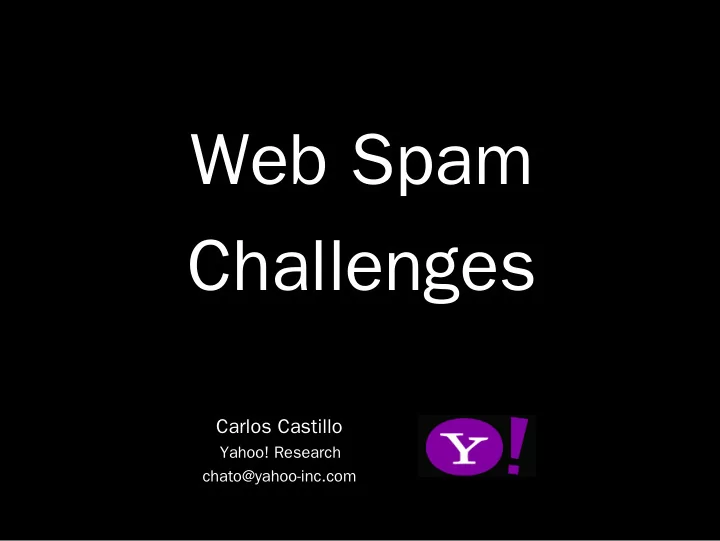

Web Spam Challenges Carlos Castillo Yahoo! Research chato@yahoo-inc.com
WEBSPAM\-UK200[67] ● Got a crawl from Boldi/Vigna/Santini in 2006Q3 ● Wrote to 20-30 people to ask for volunteers – Most said yes, and most of them didn't defect ● Created an interface for labeling – 3-4 days of work to get it right ● Labeled a few thousand elements together ● Then, did basically the same again in 2007Q3 Carlos Castillo: “Web Spam Challenges”, AIRWeb 2009.
Why is it good to do collaborative labeling? ● The labeling reflects some degree of consensus – After-the-fact methodological discussions can be very distracting, and actually there was none of it ● Webmasters do not harass you – Responsibility is shared and furthermore you tell search engines not to use these labels ● Labellers get insights about the problem Carlos Castillo: “Web Spam Challenges”, AIRWeb 2009.
Why is it bad to do collaborative labeling? ● In this particular problem, it is very expensive – You get more labels for less money if you just pay for the labels to MTs Carlos Castillo: “Web Spam Challenges”, AIRWeb 2009.
Lessons (learned?) ● Would do WEBSPAM-UK2006 waiting for the 2 nd or 3 rd crawl instead of using the 1 st one ● Would try to raise money for WEBSPAM-UK2007 and do it with MTs – If the money were enough, try to go for a larger collection Carlos Castillo: “Web Spam Challenges”, AIRWeb 2009.
Web Spam Challenges ● The good – Saved a lot of processing to participants, thus ... – Got several submissions with diverse approaches – Baseline was strong but not too much – Side-effect: good dataset for learning on graphs ● The bad – Train/test splits at host level (I, fixed in III) – Snowball sampling (II, fixed in III) – Carlos Castillo: “Web Spam Challenges”, AIRWeb 2009.
Lessons (learned?) ● Would do mostly the same ● Avoid the mistakes ● Promote much more the competition – Try to appeal to a wider audience – Get sponsorship for a prize – Carlos Castillo: “Web Spam Challenges”, AIRWeb 2009.
What is the point of all this? ● Remove a roadblock for researchers working on a topic ● Encourage multiple approaches to a certain problem – in parallel ● Keep web data flowing into universities ● Allow repeatability of the results Carlos Castillo: “Web Spam Challenges”, AIRWeb 2009.
So, if a new dataset+challenge appears ● It has to be a good problem: novel, difficult and with a range of potential applications ● Why? Because if we are going to encourage many information-retrieval researchers to work on this problem, there has to be a large treasure chest to split at the end Carlos Castillo: “Web Spam Challenges”, AIRWeb 2009.
Good signals to look for ● “The dataset for X removed a roadblock towards a complex information-retrieval problem for which no other dataset existed” ● “Research about X was only done inside companies before” ● “Problem X was increasingly threatening Web- based work/search/collaboration/etc.” ● Carlos Castillo: “Web Spam Challenges”, AIRWeb 2009.
Ideas (1/4) ● Disruptive or non-cooperative behaviour in – peer-production sites ● Examples: review/opinion/tag/tag-as-vote/vote spam ● Adversary: wants to promote his agenda/business – social networks ● Examples: find fake users ● Adversary: wants to be seen as multiple independent people ● Examples: find users that are too aggressive on promoting their own stuff? most social networks have norms against it (wikipedia/kuro5hin/digg/etc.) ● Carlos Castillo: “Web Spam Challenges”, AIRWeb 2009.
Ideas (2/4) ● Plagiarism or missing attribution – Web-scale automatic identification of sources for the statements on a document – Adversary: wants to make his posting look original ● Carlos Castillo: “Web Spam Challenges”, AIRWeb 2009.
Ideas (3/4) ● Checking/joining facts on the Web ● “The capital of Spain is Toledo (Wikipedia: Madrid)” ● “The oil spill from the tanker has killed 500 seals (BBC: 541 seals FOX: 2 anchovies)” – Adversary: wants you to believe something wrong – Related problem: revealing networks of mutually- reinforcing sites pushing a certain agenda ● Aspect of credibility on the Web (there is already a workshop on that) ● Carlos Castillo: “Web Spam Challenges”, AIRWeb 2009.
Ideas (4/4) ● Simpler problem: validating citations – This citation to page P validates the claim it is cited about? where specifically in P? – Adversary: wants to convince you of something that is not supported by the pages he is linking – ● E.g.: someone wants to convince you that Einstein believed in a personal God by quoting him selectively -- but you have access to all his books/letters/etc. Carlos Castillo: “Web Spam Challenges”, AIRWeb 2009.
Summary of proposals ● Non-cooperative behaviour in peer-production networks ● Disruptive usage of social networking sites ● Distortions or falsehoods on the web ● Citations: missing attribution (plagiarism) ● Citations: distorted attribution (invalid citation) Carlos Castillo: “Web Spam Challenges”, AIRWeb 2009.
Recommend
More recommend